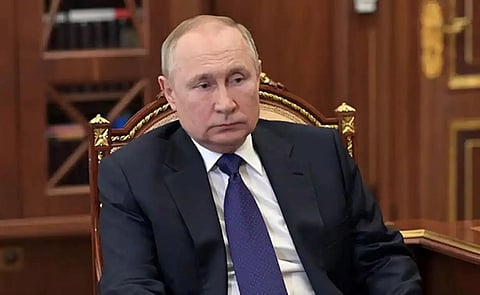
- Home
- Live Blog
- Breaking News
- Top Headlines
- Cities
- NE News
- Sentinel Media
- Sports
- Education
- Jobs

NEW DELHI: While the world focuses on the situation in Ukraine, Central Asian countries are facing a double whammy, getting increasingly worried about not just the Eastern European region but also the threats emanating from Afghan territory on their southern borders.
Led by Russian President Vladimir Putin, the heads of the Collective Security Treaty Organisation (CSTO) member states had a lot on their plates when they met at the Kremlin in Moscow on Monday.
Ukraine, NATO, the Caucasus and Afghanistan - the military alliance of former Soviet states in Eurasia agreed that the situation along the entire perimeter of the borders of the CSTO member states remains tense.
Agreeing that the current international environment does not inspire optimism, both in terms of global security and the global economy, the leaders - which included Belarus President Alexander Lukashenko, Kazakhstan President Kassym-Jomart Tokayev, Kyrgyzstan President Sadyr Japarov, Tajikistan President Emomali Rahmon and Armenian Prime Minister Nikol Pashinyan besides Putin - were unanimous in the view that Afghanistan remains "a serious destabilising factor" in the Central Asian region.
They agreed that after the return of Taliban in Kabul, Afghanistan remains a hotbed of international Islamist terrorism, drug trafficking and illegal migration with things becoming more acute as the socio-economic situation in the country deteriorates.
"We attach great importance to the development of the situation in Afghanistan. The unstable situation in this country, as well as the unrelenting activity of armed groups on the territory of Afghanistan, continue to threaten the security and stability of our states. I believe that the CSTO must take into account all potential threats and pay even more attention to ensuring the security of the southern borders of Central Asia," said Kazakhstan President Kassym-Jomart Kemelevich Tokayev.
President of the Kyrgyz Republic Sadyr Nurgozhoevich Zhaparov insisted that the Afghan problem should remain at the centre of CSTO attention and analysis.
"The situation on the southern borders of the CSTO remains very alarming, primarily due to the unimpeded activities of radical religious-terrorist structures in some Afghan provinces, whose external sponsors have their own far-reaching plans for Central Asia," said Zhaparov.
He stressed that it is necessary to implement the entire range of political-diplomatic and military-technical security measures while, at the same time, it is important to provide humanitarian assistance to the Afghan people, "among whom there are our relatives".
Tajikistan, which due to its geographical location - shares a 1344 km long border with Afghanistan - remains at the forefront of countering current threats and challenges once again highlighted the export of extremism and an increase in drug trafficking after the Taliban takeover. (IANS)
Also Watch: